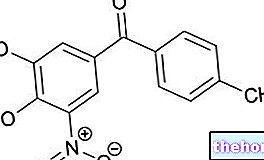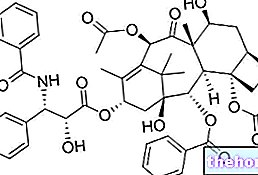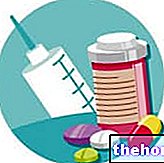SEACOR ® is a drug based on ethyl esters of polyunsaturated fatty acids (EPA and DHA not less than 85%).
THERAPEUTIC GROUP: Hypolipidemics - Ethyl esters of polyunsaturated fatty acids

SEACOR ® indications
SEACOR ® is indicated in the treatment of hypertriglyceridemia. The intake of this drug should follow or possibly be combined with an adequate dietary plan.
SEACOR ® can also be used in the prevention of cardiovascular accidents in patients with a previous history of myocardial infarction.
SEACOR ® mechanism of action
The oral intake of SEACOR ® guarantees a significant supply of ethyl esters of polyunsaturated fatty acids, which are effectively absorbed in the intestine. Like other lipids, as these nutrients cannot circulate freely in the bloodstream, these nutrients are transported in the form of lipoproteins ( in particular chylomicrons and VLDL).
The lipid-lowering therapeutic action is justified by the ability of eicosapentaenoic acid (EPA) and docosahexaenoic acid (DHA) to reduce the hepatic synthesis of triglycerides and cholesterol, rebalancing the patient's lipidemic profile. it is instead determined by their antithrombotic, anti-inflammatory and antiplatelet activity.
These effects are mainly achieved through a competitive mechanism against arachidonic acid, which allows to reduce the synthesis - by endothelial and leukocyte cells - of prostaglandins and leukotrienes with marked pro-inflammatory activity.
To these effects are added others, such as the antiarrhythmic and vasoprotective ones, which are still under study and characterization.
Studies carried out and clinical efficacy
OMEGA 3 AND ATTENTION DEFICITIES AND HYPERACTIVITY "
J Atten Disord. 2010 Nov; 14: 232-46.
The impact of polyunsaturated fatty acids in reducing child attention deficit and hyperactivity disorders.
Transler C, Eilander A, Mitchell S, van de Meer N.
Several studies agree that a lack of omega 3 could lead to a decline in cognitive abilities through an increase in pro-inflammatory stimuli and hormonal deregulation.
This study, even without providing statistically important evidence, shows how supplementation with PUFA for 3-4 months in children with attention deficit and hyperactivity can favor a regression of symptoms. These results are in line with other studies highlighting the positive effects of omega 3s on the ability to concentrate in healthy individuals and also in athletes.
2.OMEGA 3 AND POST-HEART MORTALITY
Circulation. 2010 Nov 8.
OMEGA, a Randomized, Placebo-Controlled Trial to Test the Effect of Highly Purified Omega-3 Fatty Acids on Top of Modern Guideline-Adjusted Therapy After Myocardial Infarction.
Rauch B, Schiele R, Schneider S, Diller F, Victor N, Gohlke H, Gottwik M, Steinbeck G, Del Castillo U, Sack R, Worth H, Katus H, Spitzer W, Sabin G, Senges J; for the OMEGA Study Group.
Just published study that evaluates the efficacy of omega 3 in the therapeutic-preventive protocol of the post-heart attack patient. Unlike the therapeutic indications, this very important study did not observe a statistically significant reduction in mortality in heart attack patients treated with omega 3 for one year.
3. OMEGA 3 AND MOOD DISORDERS
Curr Opin Investig Drugs. 2008 Jan; 9: 57-64.
The role of omega-3 fatty acids in mood disorders.
Stahl LA, Begg DP, Weisinger RS, Sinclair AJ.
As it is now known, omega 3s re-enter the brain cell structure, modulating their function. Several studies have in fact shown how a deficiency of EPA and DHA can be associated with the genesis of depression. For this reason, numerous studies are available in the literature. to evaluate the efficacy of omega 3 supplementation in improving mood disorders. Although there are still no clinical trials of particular importance that allow statistically valid data to be obtained, the first evidence suggests an "antidepressant" role, probably associated with the reduction of inflammatory prostaglandins and the consequent increase in neurotrophic factors.
Method of use and dosage
SEACOR ® soft capsules of 500mg / 1000mg of ethyl esters of polyunsaturated fatty acids, titrated in EPA and DHA at at least 85% and with a ratio of 0.9 / 1.5: in the treatment of hypertriglyceridemia the recommended dosage is 3 soft capsules of 1 gram per day, divided into 3 different intakes. It is advisable to start pharmacological treatment only in case of failure of previous non-pharmacological lipid-lowering strategies (adequate lifestyle and diet hypolipidic). Any dosage adjustments should be made by the physician following a "careful evaluation of the patient's state of health and therapeutic goals.
In the primary prevention of the infarcted subject, the daily dosage of 1 gram is preferred.
IN ANY CASE, BEFORE TAKING SEACOR ® - THE PRESCRIPTION AND CONTROL OF YOUR DOCTOR IS NECESSARY.
SEACOR ® warnings
SEACOR ® more generally, the ethyl esters of polyunsaturated fatty acids, is very well tolerated and without particular precautions for use. However, like any other lipid-lowering drug therapy, before and during intake it is advisable to follow a hypolipidic diet. and healthy habits of life.
The administration of this drug in patients suffering from bleeding disorders or undergoing anticoagulant therapy, should be carefully supervised by a physician in order to avoid the onset of bleeding episodes.
PREGNANCY AND BREASTFEEDING
Although there are no specific evidence and clinical trials in this regard, the intake of omega 3 does not seem to present mutagenic and teratogenic effects on the fetus. Despite this, it would always be advisable to consult your doctor and your gynecologist in order to assess the correct relationship between risks. and benefits.
Interactions
The high safety profile of polyunsaturated fatty acids, which we remember are normally present in nature, minimizes the risk of drug and non-drug interactions, potentially dangerous for the patient's health. In fact, the only drugs that - taken at the same time as SEACOR ® could compromise the state of health of the patient, are the anticoagulants, which specifically could favor the presence of haemorrhagic phenomena.
SEACOR ® Contraindications
SEACOR ® is contraindicated in case of hypersensitivity to one of its components.
Undesirable Effects - Side Effects
The adverse reactions described after taking SEACOR ® are limited to the onset of nausea, vomiting and heartburn.
Therefore, the drug appears to be very well tolerated.
Note
SEACOR ® can only be sold under medical prescription.
The information on SEACOR ® published on this page may be out of date or incomplete. For a correct use of this information, see the Disclaimer and useful information page.























-nelle-carni-di-maiale.jpg)




